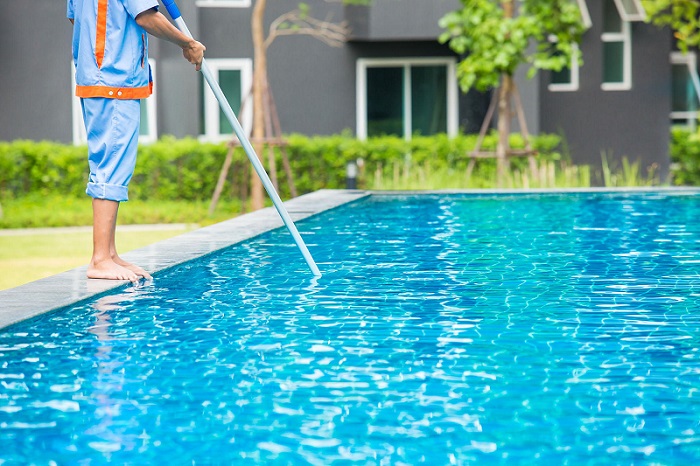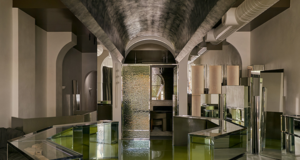

Pool water is the most rewarding thing in the summers. You can have immense fun with your friends and family on picnic terms. However, maintaining a pool clean and healthy for everyone is an important task and requires constant attention. Dirty pools can cause a lot of infections, skin allergies and can spread other contagious diseases but that shouldn’t stop you from having fun! Maintaining a pool can be fairly easy if you are determined enough.
Each pool is different and the maintenance depends on the type and usability of the pool whether it’s around the year or seasonal. There are four major components of a pool whether it’s a small family pool or a massive party ruler. These include:
- Pool Water: Water maintenance means keeping it clean to avoid contaminants and pollutants, including the buildup of corrosion and minerals which can cause diseases and damage to the pool additional accessories and hardware.
- Pool’s Liner/ interior Wall: Everybody and everything that enters a pool are more or less in constant engagement with the pool interiors and the water is always exposed to it as well. Any sort of algae, mold, debris cause the water to be polluted as well as form diseases/ allergies and can prove to be contagious.
- The Filter System: The pool filter system is known as its liver. It is responsible to keep the water circulating and clear out dirt and other contaminants from the water since still water can form a lot of different bacteria.
- Skimmers and Returns of the Pool System: The part of the pool system works as veins and arteries. The skimmers suck the water from the pool to the filter system and the secondary function pushes it back. The combined system is important to clean so the water can pass without any obstructions.
So, How Often Does the Pool Need Maintenance?
Per week is the minimum advised. Each pool requires circulation, cleaning, and a touch of chemicals. A dirty pool has cloudy water and lots of infestation and the above components are important for maximum circulation and cleaning for which you are required to run your pump and filter at least 10-12 hours a day.
One technique to keep your pool clean is backwashing which reverses the water flow through the filter and shunts the dirt and buildup towards the port and out of your pool to save your pool from debris, dirt, contamination or infestation from any leaves, mould to any other residues from unknown products. It is important to vacuum, skim and brush your pool minimum weekly.
Pool water is slightly different from the chemicals included in it for sanitizing purposes. Each time you undo and fill up your pool water, it is important to check the water balance with the pool water testing kit and before adding any chemicals you should know the basic effects, measurement and importance of these chemicals. Generally speaking, your pool water PH level should be around 7.4 to 7.6. low PH level means your water is acidic. to avoid any spikes in basicity or acidity of oh level, the pool water ppm should have 100 to 150 alkalinity. If you want to spare yourself from chemistry, Saltwater chlorinatoris one of the most effective ways to convert the salt in the water into chlorine for a soft and comfortable swimming experience.
Pool water is the most rewarding thing in the summers. You can have immense fun with your friends and family on picnic terms. However, maintaining a pool clean and healthy for everyone is an important task and requires constant attention. Dirty pools can cause a lot of infections, skin allergies and can spread other contagious diseases but that shouldn’t stop you from having fun! Maintaining a pool can be fairly easy if you are determined enough.
Each pool is different and the maintenance depends on the type and usability of the pool whether it’s around the year or seasonal. There are four major components of a pool whether it’s a small family pool or a massive party ruler. These include:
-
Pool Water: Water maintenance means keeping it clean to avoid contaminants and pollutants, including the buildup of corrosion and minerals which can cause diseases and damage to the pool additional accessories and hardware.
-
Pool’s Liner/ interior Wall: Everybody and everything that enters a pool are more or less in constant engagement with the pool interiors and the water is always exposed to it as well. Any sort of algae, mold, debris cause the water to be polluted as well as form diseases/ allergies and can prove to be contagious.
-
The Filter System: The pool filter system is known as its liver. It is responsible to keep the water circulating and clear out dirt and other contaminants from the water since still water can form a lot of different bacteria.
-
Skimmers and Returns of the Pool System: The part of the pool system works as veins and arteries. The skimmers suck the water from the pool to the filter system and the secondary function pushes it back. The combined system is important to clean so the water can pass without any obstructions.
So, How Often Does the Pool Need Maintenance?
Per week is the minimum advised. Each pool requires circulation, cleaning, and a touch of chemicals. A dirty pool has cloudy water and lots of infestation and the above components are important for maximum circulation and cleaning for which you are required to run your pump and filter at least 10-12 hours a day.
One technique to keep your pool clean is backwashing which reverses the water flow through the filter and shunts the dirt and buildup towards the port and out of your pool to save your pool from debris, dirt, contamination or infestation from any leaves, mould to any other residues from unknown products. It is important to vacuum, skim and brush your pool minimum weekly.
Pool water is slightly different from the chemicals included in it for sanitizing purposes. Each time you undo and fill up your pool water, it is important to check the water balance with the pool water testing kit and before adding any chemicals you should know the basic effects, measurement and importance of these chemicals. Generally speaking, your pool water PH level should be around 7.4 to 7.6. low PH level means your water is acidic. to avoid any spikes in basicity or acidity of oh level, the pool water ppm should have 100 to 150 alkalinity. If you want to spare yourself from chemistry, Saltwater chlorinator is one of the most effective ways to convert the salt in the water into chlorine for a soft and comfortable swimming experience.


